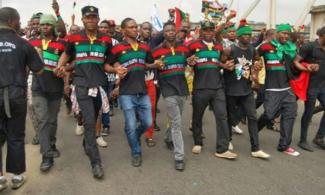
Lawyer representing Biafra secessionist group, the Indigenous People of Biafra, Barrister Ifeanyi Ejiofor has submitted a notice of appeal seeking a reversal of court order proscribing the group and labeling it a terrorist organization.
In the notice of appeal, the lawyer listed five grounds on which the ruling of the lower court should not be allowed to stand.
The lawyer asked the court to examine whether IPOB meets the requirements for a group to be designated a terrorist organization as stated in Nigeria’s Terrorism Act.
The lawyer also argued that contrary to stipulations in the Act, the president did not ‘personally’ sign the order declaring IPOB a terrorist organization.
“The purported President’s approval dated the 18th September, 2017 addressed to the Hon. Attorney General of the Federation & Minister of Justice, captioned “Approval of the President, Commander-In-chief of the Armed Forces for the declaration/proscription of Indigenous People of Biafra (IPOB) as a Terrorist Organization pursuant to section 2(I) (A) (B) & (C) of the Terrorism Prevention (Amendment) Act 2013”, was signed by ABBA KYARI, designated as Chief of Staff to the President, and was not signed by the President as required under Section 2 (1)(C) of the Terrorism Prevention (Amendment) Act, 2013,” IPOB lawyer said in the notice filed at the court of appeal.
According to the lawyer, the signing of the order declaring IPOB a terrorist organization by Chief of Staff to the President is a violation of section 2 (1)(C) of the Terrorism Prevention Amendment Act, 2013.
The lawyer also asked the appellate court to examine the process adopted by the lower court in declaring IPOB a terrorist organization, as he insisted that his client was not granted fair hearing.
He also maintained that that the constitution provides for freedom of association and that IPOB does not possess any weapon capable of inflicting harm on anybody.
Specifically, the lawyer asked the court to declare, “Whether the Respondent/Applicant is a juristic person capable of suing or being sued in Nigeria Court, whether the order made Exparte on 25th September 2017 proscribing the Respondent/Applicant was made in violation of the principle of audi alterem partem (fair hearing) and whether the Applicant’s right to freedom of expression, assembly and association has been breached”.
The lawyer added that affidavit evidence placed before the lower court shows in clear terms that the Appellant does not possess any form of arms, or weapons in the exercise of their constitutionally guaranteed rights; or have any history of violence or had engaged in any form of killings”.
He also asserted that there are other groups in the country engaging in notorious activities, yet has not been labelled as terrorist group while asking the appellate court to overturn the ruling of the lower court.